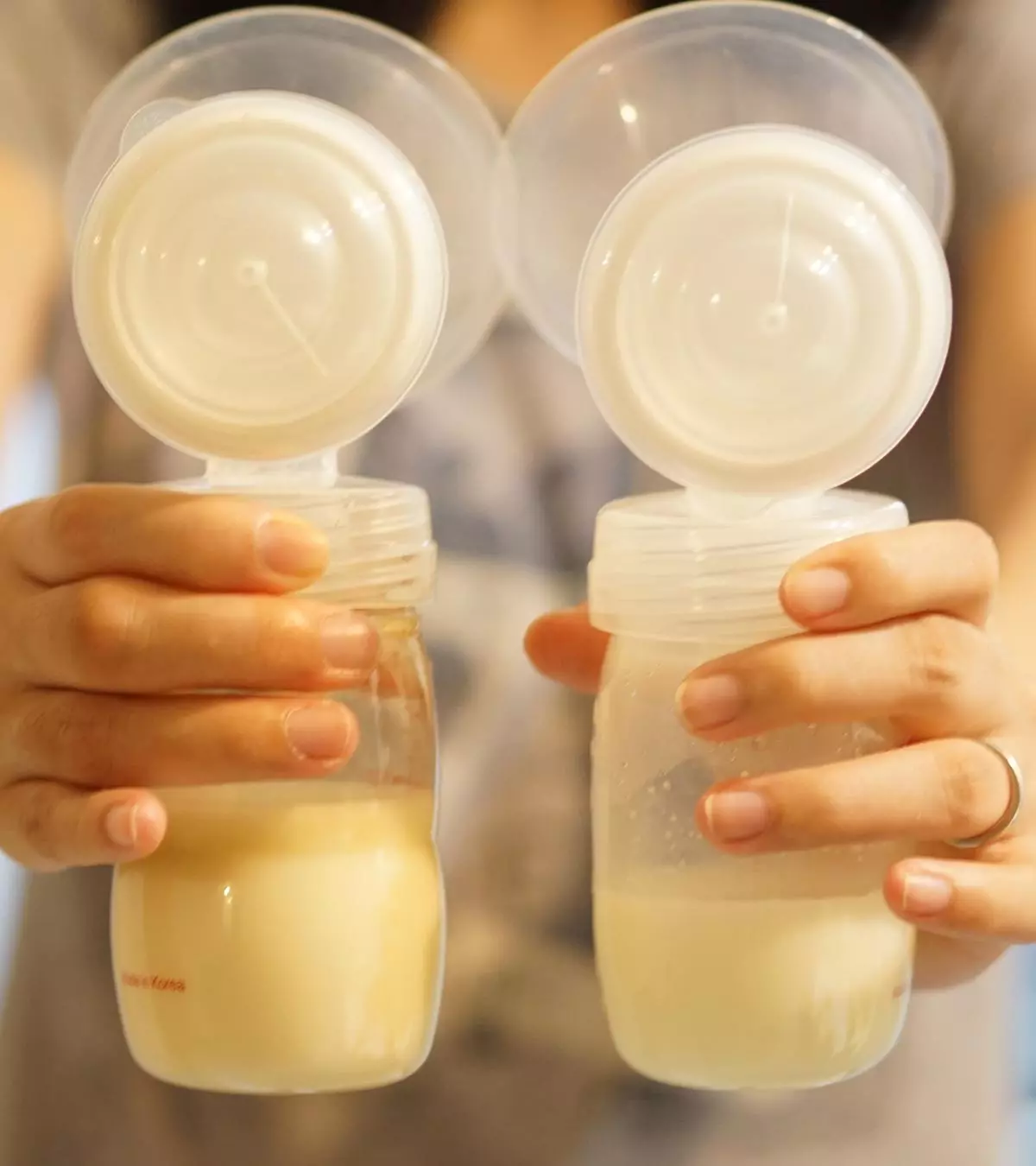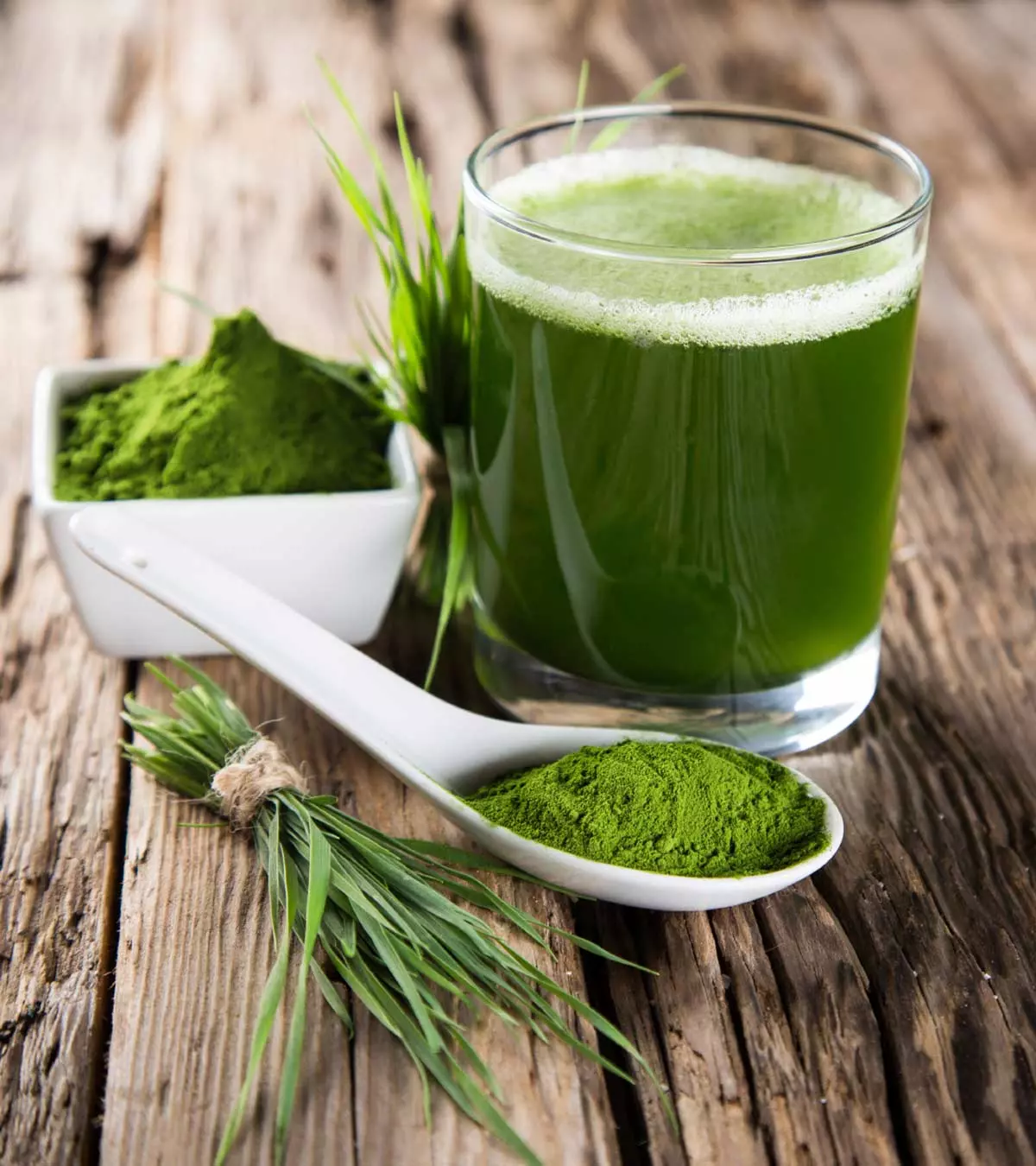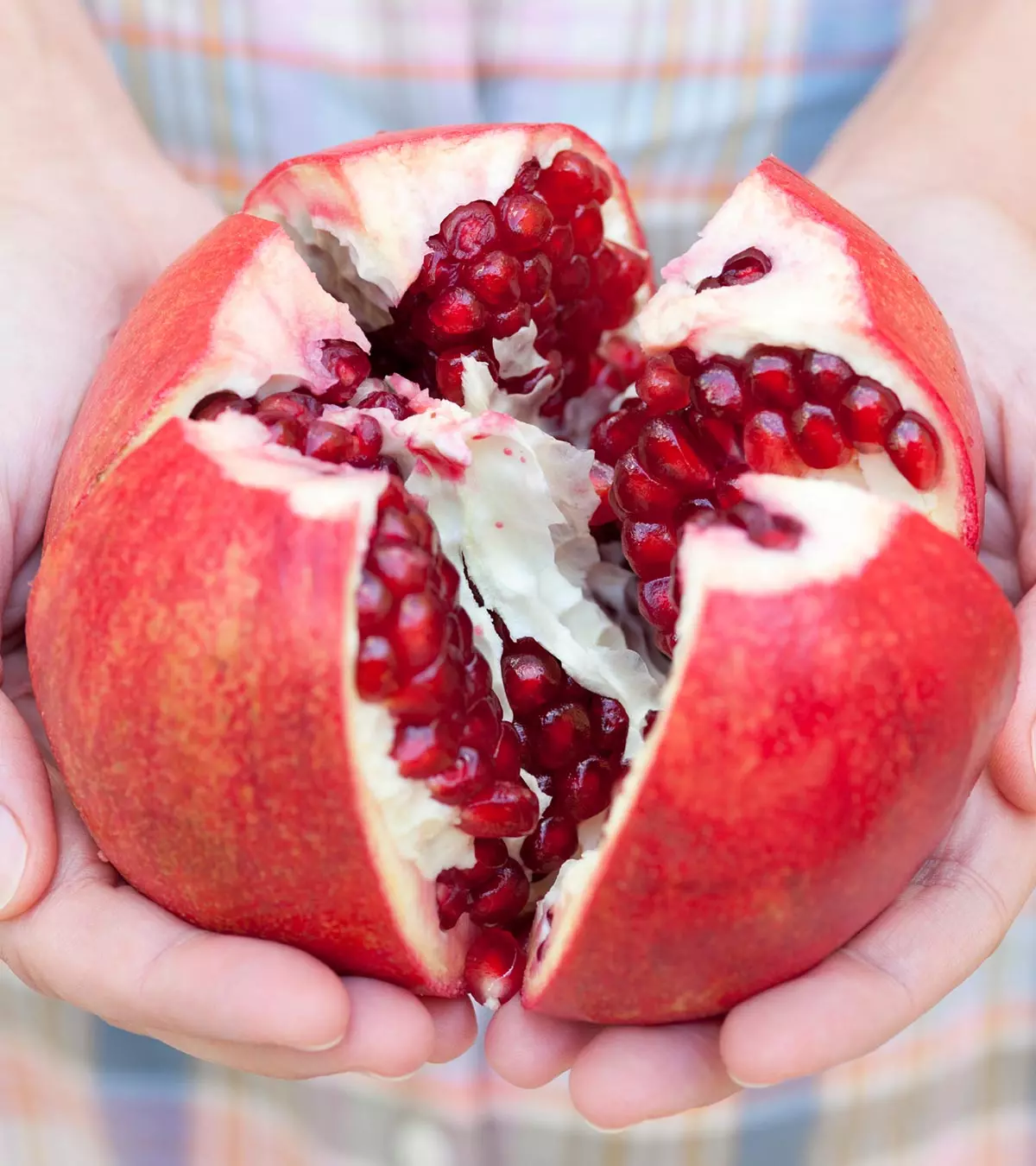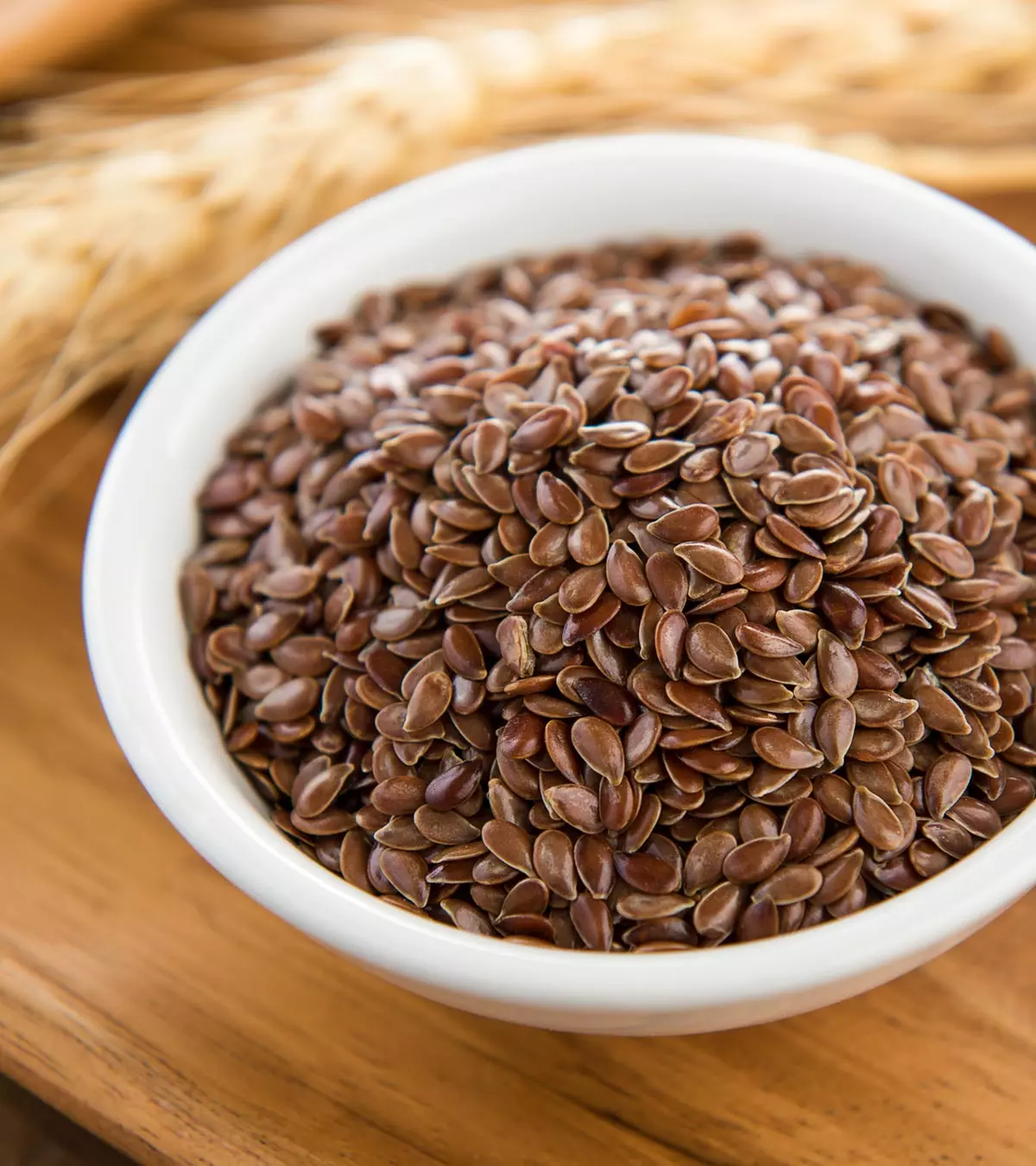
Image: Shutterstock
Fasting is an integral part of several religions in the world. For many, it is a way to display their undeterred faith in the God they pray to. Hence, whether a person should fast or not is a deeply personal choice. But is intermittent fasting while breastfeeding safe? Restricting your calorie intake during nursing may impact your breast milk supply. Besides, eating less than recommended during lactation could affect your overall health. Hence, carefully consider the pros and cons of continuing fasting while nursing to ensure your and your child’s good health. So, read this article to know more about the safety of fasting when you are breastfeeding your baby.
Key Pointers
- Most religions provide a conditional solution for fasting while breastfeeding.
- It is crucial to consume small, frequent meals, stay hydrated, rest, conserve energy, and monitor the baby’s condition during fasting.
- Intermittent fasting during the initial stages of breastfeeding may lead to insufficient nutritional intake for both the mother and the baby.
- Extended fasting may further result in premature weaning and affect breast milk composition.
What Does Religion Say About Fasting While Breastfeeding?

Image: Shutterstock
Most religions are flexible when it comes to fasting during breastfeeding. Here’s what the major religions have to say about the issue:
- If you are a Muslim and planning to fast during Ramadan, wait. According to Islamic law, a breastfeeding mother does not need to fast. But missed fasts must be compensated for at a later date (1).
- According to Jewish tradition, a breastfeeding woman is required to fast on Yom Kippur. But there is room for flexibility for individual cases (2).
- Hinduism is pretty flexible when it comes to fasting and breastfeeding. Most breastfeeding women are encouraged not to fast and ensure adequate nutrition to support baby’s growth and development.
- Nursing Catholic women are exempt from fasting during Lent (3). Women can offer other sacrifices like giving up eating their favorite food during Lent instead.
What Does Science Say?

Image: Shutterstock
There isn’t enough research to show how fasting can affect breastfeeding or milk production. But the studies done on the subject show that there is a marked difference in breastfeeding relation during fasting (4). The studies indicate that fasting can lead to premature weaning and an abrupt end to breastfeeding.
But these issues arise only after a prolonged period of fasting (like during Ramadan). But one-day fasting has no impact on breast milk.
How Does Fasting Impact Breast Milk
The fat content in breast milk does not change when you fast for a day. But the same cannot be said for the longer duration of fasting. We already know that inadequate nutrition does not change the composition of breast milk (5). The same can happen while fasting. But fasting can lead to deficiency in other nutrition in breast milk.
Therefore, adequate hydration is crucial while breastfeeding during fasting, as inadequate water intake and electrolyte balance can impact milk production, immune system function, and overall maternal health.
Fasting For Breastfeeding Mothers – Impact
If fasting leads to weight loss, it may be time to rethink your priorities. This is because breast milk will leach fat off your body to compensate for inadequate fat in your diet and you may end up losing excessive calories while breastfeeding. Therefore, breastfeeding combined with fasting might not be safe for both maternal and infant health. If you want to lose pregnancy weight, fasting is not the answer. Instead, it may impact your metabolism, blood sugar levels, and leave you malnourished.
 Quick fact
Quick factTips To Make Fasting Easier While Breastfeeding
If you want to breastfeed and fast in tandem, you’ll need to keep a few points in mind:
1. A good breastfeeding diet
Make sure you are getting a good breastfeeding diet when you do eat. If you are cutting out a few specific food items, like meat, from your diet, compensate with supplements.
 Quick tip
Quick tip2. Drink As Much As You Can

Image: Shutterstock
Breastfeeding can leave you thirsty. So, make sure you are getting enough fluids. This is especially important during summer months to avoid dehydration when breastfeeding. If you can’t drink water while fasting, make sure to drink enough of it before and after your fasting period.
Sharon Tjaden-Burkes, a mother of two, exercised and ate a calorie-restricted diet after childbirth but didn’t lose much weight. Then, around 13 months postpartum, she learned about intermittent fasting (IM fasting) from one of her friends. From about 14 months postpartum, she started following the IM fasting.
She says, “At almost 18 months postpartum, I’ve returned to my pre-pregnancy weight, and I’ve lost an additional two pounds. If you’re thinking about intermittent fasting, I will say that the first week is probably the hardest. I was starving until I would eat at 10:00 a.m. But drinking water helped. After a week or so, my body had re-adjusted to a new normal, and it’s not nearly so hard to make it to 10 a.m. now, several months later, as it was then. Not only did I lose weight, but I think that fasting helped to reset everything in my body (i).”
3. Postpone Heavy Chores
If you can, try to postpone chores that take up a lot of energy for later.
4. Rest As Much As You Can

Image: Shutterstock
Breastfeeding can be draining. And if you are fasting, you may feel more dehydrated. So, rest when you can, as much as you can to keep your energy conserved.
5. Keep An Eye On Your Baby
There is a slim chance that your baby may get less milk while you fast. So keep an eye on her. If you notice fewer wet nappies, greenish poop, weight loss, etc. talk to your doctor.
Seeking guidance from a healthcare provider or lactation consultant can be helpful when considering fasting while breastfeeding, as they can provide personalized recommendations and support.
Frequently Asked Questions
1. How long can I fast while breastfeeding?
Currently, there are no specific guidelines for the duration of fasting for a breastfeeding woman. However, it is recommended to keep shorter fasting windows no more than 14 hours because nursing women need more calories. If the caloric intake is low, it can negatively impact the milk supply and energy level. You may experience fatigue during breastfeeding, and it will impact the health of both mother and baby. Other alternatives for fasting include eating smaller meals, avoiding processed food, and eating whole foods like fruits and vegetables.
2. How long can my breastfed infant go without eating?
A newborn baby does not need excessive quantities of milk to feel full. They can stay full for around two to four hours after a single feeding. It’s essential to notice the baby’s cues and feed them when they show signs of hunger (8). On average, in the first few weeks and months, the baby will need to be breastfed around 8 to 12 times in a single day. They can stay without eating for around two hours (9).
3. What are the benefits of fasting while breastfeeding?
Several studies suggest that fasting may offer various advantages, including weight loss, enhanced insulin sensitivity, decreased inflammation, and cellular repair mechanisms (10). Breastfeeding while fasting can increase stress, lowering glucose and increasing fat and protein breakdown (11). Nevertheless, a drastic calorie reduction can lead to a drop in milk supply. Ensure you eat 500 calories more than before pregnancy for a healthy breastmilk supply (12).
4. Should I consult with my healthcare provider before fasting while breastfeeding?
It’s crucial to consult your healthcare provider before fasting while breastfeeding. They can offer personalized guidance, prioritizing your and your baby’s safety by considering your unique situation. Reach out to them for clarity and reassurance.
5. Can fasting while breastfeeding affect my baby’s health?
Fasting did not significantly impact the macronutrient content of breast milk or the growth of infants (13). A drop in breast milk supply due to fasting can lead to malnutrition in exclusively breastfed infants. Ensuring you consume nutritious food and sufficient calories during the eating period can help maintain breastmilk supply.
6. Can fasting while breastfeeding affect the taste of my breast milk?
So, should you fast while breastfeeding? That depends on you. If your child is older and has started solids, fasting will not have a big impact. But if your baby is younger than six months, you can avoid fasting.
Infographic: What Should Breastfeeding Women Eat During Fasting?
Fasting during breastfeeding should be followed with a proper diet to make up for the skipped meals. This infographic provides a list of healthy foods to include in your fasting diet. Consult your doctor about it first before proceeding with it and once they give the go-ahead, save this list for a nutritious breastfeeding diet while fasting. Illustration: Momjunction Design Team
Illustration: Helpful Tips To Do Fasting When Breastfeeding
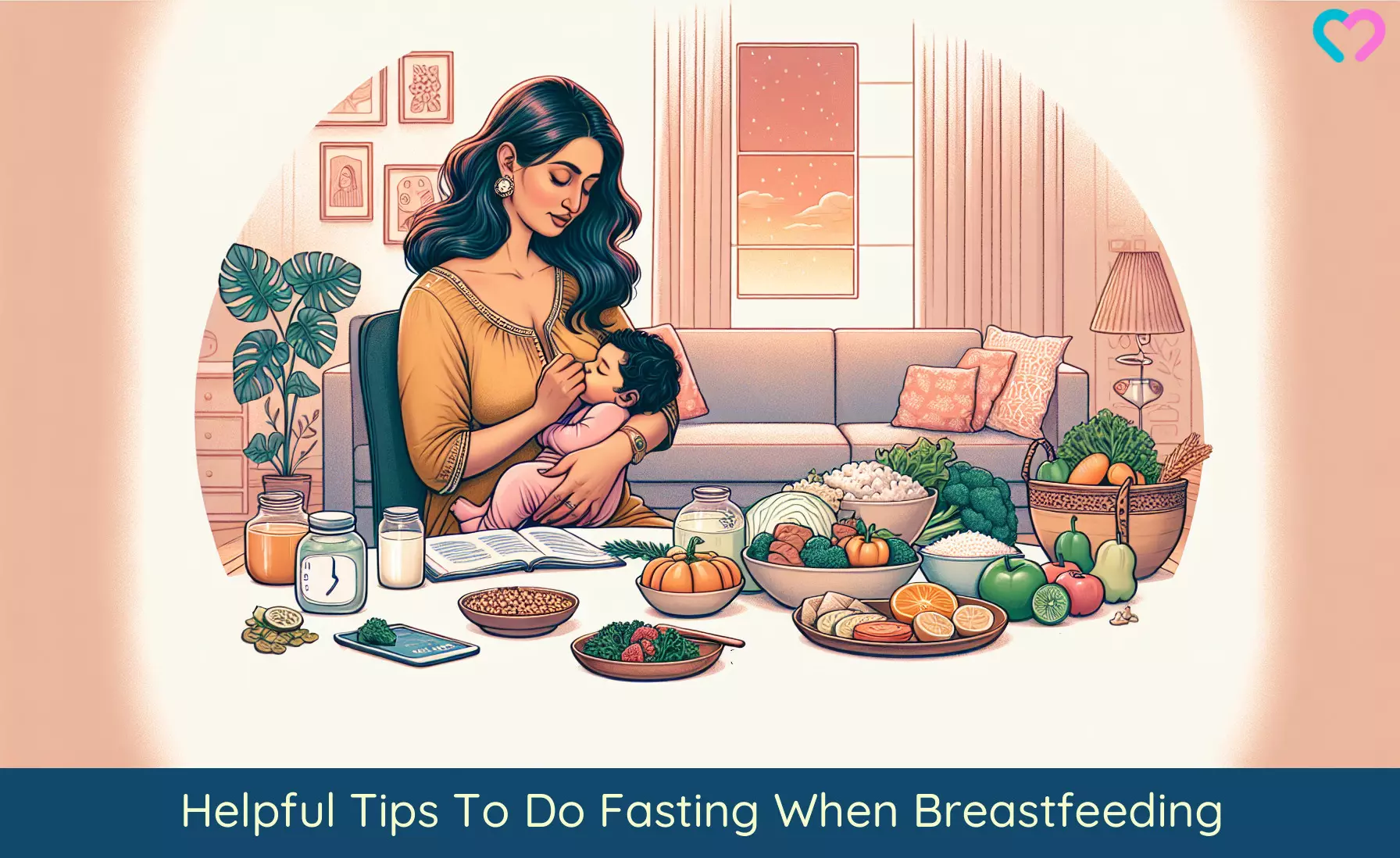
Image: Dall·E/MomJunction Design Team
Personal Experience: Source
MomJunction articles include first-hand experiences to provide you with better insights through real-life narratives. Here are the sources of personal accounts referenced in this article.
i. Postpartum weight loss reality check.https://becomingmotherblog.com/2018/07/20/postpartum-weight-loss-reality-check/
References
- Ramadan health guide.
https://www.elft.nhs.uk/sites/default/files/Ramadan%20Guide%20to%20Healthy%20Fasting.pdf - Breastfeeding and Yom Kippur.
http://www.jewishwomenshealth.org/case.php?case=84 - Catholic Activity: Lenten Fasting and Abstinence Regulations.
https://www.catholicculture.org/culture/liturgicalyear/activities/view.cfm?id=1013 - I O Ertem et al.; (2001); Attitudes and practices of breastfeeding mothers regarding fasting in Ramadan.
https://pubmed.ncbi.nlm.nih.gov/11737021/ - Constituents of human milk.
https://archive.unu.edu/unupress/food/8F174e/8F174E04.htm - Can You Do Intermittent Fasting While Breastfeeding?
https://health.clevelandclinic.org/can-you-do-intermittent-fasting-while-breastfeeding - Ramadan for the Breastfeeding Mother.
https://breastfeeding.org.sg/ramadan-for-the-breastfeeding-mother/ - How much and how often to breastfeed.
https://www.cdc.gov/infant-toddler-nutrition/breastfeeding/how-much-and-how-often.html?CDC_AAref_Val=https://www.cdc.gov/nutrition/infantandtoddlernutrition/breastfeeding/how-much-and-how-often.html - Breastfeeding FAQs: How Much and How Often.
https://kidshealth.org/en/parents/breastfeed-often.html - Intermittent fasting: The positive news continues
https://www.health.harvard.edu/blog/should-you-try-intermittent-fasting-for-weight-loss-202207282790 - Mechanisms to conserve glucose in lactating women during a 42-h fast.
https://www.ars.usda.gov/research/publications/publication/?seqNo115=250197
- Losing weight after pregnancy.
https://medlineplus.gov/ency/patientinstructions/000586.htm - Karel Allegaert, et al.; (2020); Acute Maternal Fasting or Fluid Abstention Does Not Significantly Affect the Macronutrient Composition of Human Milk: Clinical and Clinical Research Relevance
https://www.ncbi.nlm.nih.gov/pmc/articles/PMC7346150/ - Influence of maternal diet on flavor transfer to amniotic fluid and breast milk and children’s responses: a systematic review
https://pubmed.ncbi.nlm.nih.gov/30982867/
Community Experiences
Join the conversation and become a part of our nurturing community! Share your stories, experiences, and insights to connect with fellow parents.
Read full bio of Dr. Surabhi Sangwai
Read full bio of Swati Patwal
Read full bio of Rohit Garoo
Read full bio of Shinta Liz Sunny







